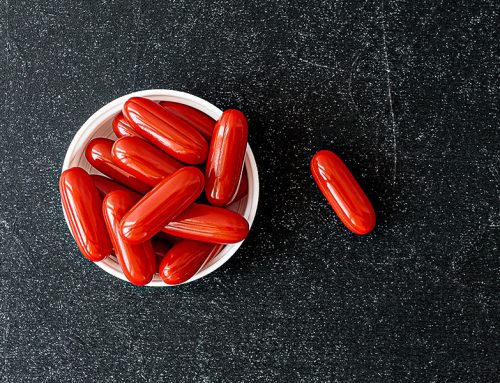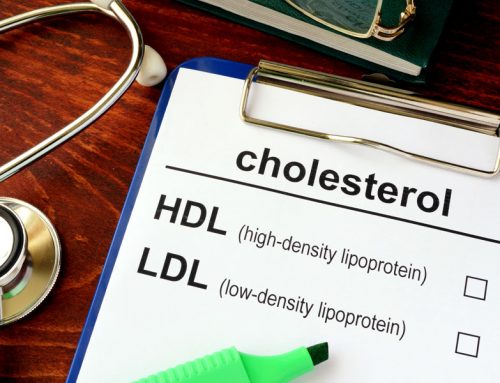
Dr. Anne Louise Mortensen, lead author of the European sub-group analysis of the Q-Symbio Study of CoQ10 adjunctive treatment of chronic heart failure patients, pictured together with Dr. and Mrs. William Judy. Dr. Mortensen suggests that one reason for the enhanced effectiveness of the CoQ10 treatment in the European sub-group might be better compliance on the part of the patients. CoQ10 supplements can work only if they are taken as they should be: daily, with meals containing some fat, and in divided doses.
The therapeutic efficacy of Coenzyme Q10 adjunctive treatment of chronic heart failure patients – 3 times 100 milligrams daily for two years – was demonstrated in the original Q-Symbio Study (n = 420) published in the JACC specialty journal Heart Failure [Mortensen 2014].
Now, an analysis of just the European portion of the Q-Symbio Study participants (n = 231) has shown that the benefits of Coenzyme Q10 supplementation were enhanced in the more rigorously guidelines-treated European patients [Mortensen 2019].
Compared to placebo, the CoQ10 supplementation in addition to the patients’ conventional heart failure medications was associated with the following beneficial effects:
- Significant improvement in the patients’ NYHA class
- Significant reduction in the primary endpoint: major adverse cardiovascular events
- Significant increase in the patients’ ejection fraction
- Significant reduction in all-cause mortality
- Significant reduction in unplanned hospitalizations of the patients
- Borderline significant reduction of 51% in the total number of cardiovascular deaths (p = 0.052)
No Problem with Adverse Effects with CoQ10 Supplementation
The researchers who analyzed the data from the European Q-Symbio study participants found no differences in the number of adverse events in the CoQ10-treated group and in the placebo group [Mortensen 2019]. Adverse effects associated with CoQ10 supplementation are few in number and generally consist of the occasional gastrointestinal upset [Mantle & Hargreaves].
Comparing the European Group with the Total Q-Symbio Group
Many of the factors that distinguished the European Q-Symbio Study heart failure patients from the total Q-Symbio Study group of patients (which included Asian and Australian patients) would seem to make it more difficult for the CoQ10-treated group to show significant improvement compared to the placebo group; even so, that is what happened. The European heart failure patients had the following characteristics:
- Slightly older
- With slightly lower heartbeat
- With somewhat higher ejection fraction
- With a higher percentage of atrial fibrillation
- More frequently prescribed beta-blockers, statins, and anti-coagulants
- Less frequently prescribed digoxin
- More likely to be receiving device-based therapy
In sum: despite being older, despite having lower baseline heartbeats and higher baseline ejection fractions, despite using beta-blockers and anti-coagulants more consistently – all factors that could, in theory, make clinical improvement more difficult – the European heart failure patients who took the active CoQ10 treatment did show significant reduction of adverse cardiovascular events, significant improvement of ejection fraction, and significant improvement of symptoms and mortality compared to the placebo group of patients [Mortensen 2019].
Conclusion: CoQ10 Supplementation A Necessary Adjunctive Treatment for Heart Failure Patients
- Endogenous bio-synthesis of Coenzyme Q10 is the major source of Coenzyme Q10. Unfortunately, endogenous production of Coenzyme Q10 declines with increasing age once we reach adulthood [Kalén]. CoQ10 supplementation is a necessity to make up for the loss.
- Coenzyme Q10 is an essential component in the cellular production of ATP energy in the mitochondria. Moreover, Coenzyme Q10 has antioxidative properties that protect cells against oxidative damage caused by harmful free radicals [Mortensen 2019].
- The original Q-Symbio Study and the later analysis of the European portion of the Q-Symbio Study have demonstrated the therapeutic efficacy of adjunctive treatment of chronic heart failure patients with 300 milligrams daily of a ubiquinone Coenzyme Q10 [Mortensen 2014; Mortensen 2019].
- CoQ10 supplementation at the level of 300 milligrams daily is safe, effective, and affordable [Mortensen 2014; Mortensen 2019].
- Not all CoQ10 supplements are equally well absorbed and effective. The formulation of the CoQ10 supplement is decisive for absorption and bio-availability. Formulation of the CoQ10 supplement is more important than the form of the Coenzyme Q10, i.e. whether the ubiquinone form or the ubiquinol form [Lopez-Lluch 2019].
Read our key article on CoQ10 as adjuvant therapy for heart failure
Sources
Kalén, A., Appelkvist E.L., Dallner G. (1989). Age-related changes in the lipid compositions of rat and human tissues. Lipids, 24(7):579–584.
López-Lluch, G., Del Pozo-Cruz, J., Sánchez-Cuesta, A., Cortés-Rodríguez, A. B., & Navas, P. (2019). Bioavailability of coenzyme Q10 supplements depends on carrier lipids and solubilization. Nutrition, 57, 133–140.
Mantle, D. & Hargreaves, I. (2019). Coenzyme Q10 and degenerative disorders affecting longevity: an overview. Antioxidants, 8: 44-53.
Mortensen, S. A., Rosenfeldt, F., Kumar, A., Dolliner, P., Filipiak, K. J., Pella, D., & Littarru, G. P. (2014). The effect of coenzyme Q10 on morbidity and mortality in chronic heart failure: results from Q-SYMBIO: a randomized double-blind trial. JACC. Heart Failure, 2(6), 641-649.
Mortensen, A. L., Rosenfeldt, F., & Filipiak, K. J. (2019). Effect of Coenzyme Q10 in Europeans with chronic heart failure: A sub-group analysis of the Q-Symbio randomized double-blind study. Cardiology Journal, 26(2): 147-156.
The information contained in this review article is not intended as medical advice and should not be construed as such.









Leave A Comment